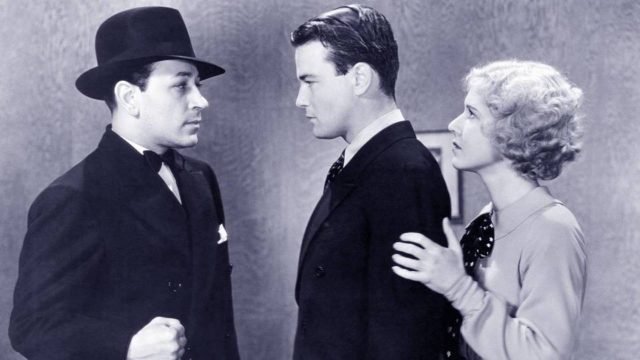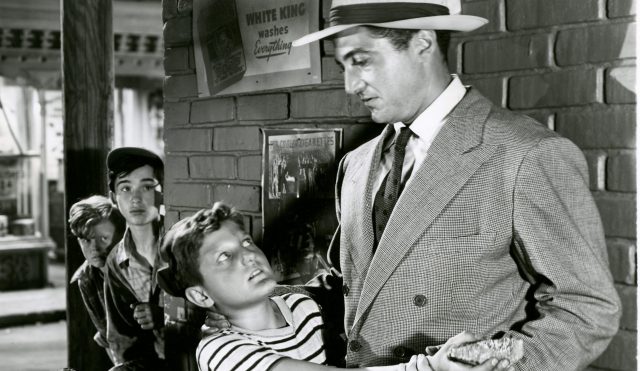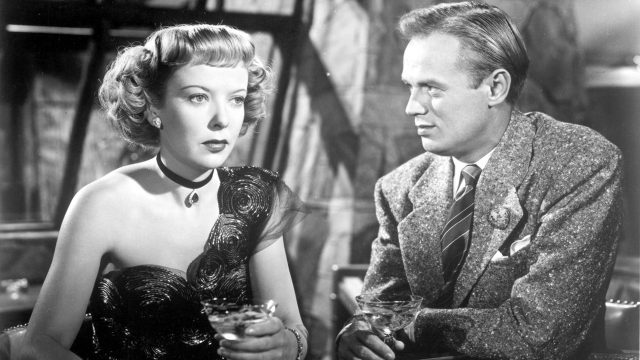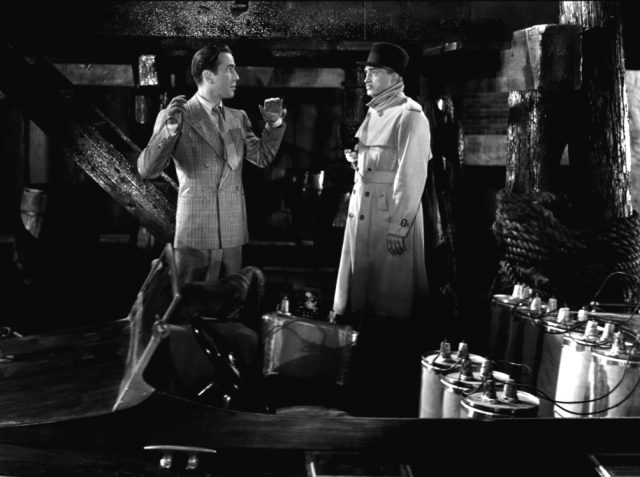TCM Classic Film Festival 2019: Part One, by David Bax

This year marked the tenth annual TCM Classic Film Festival, the annual gathering of classic film enthusiasts in Hollywood for a long weekend of old movies and the love of same. Though I couldn’t fully celebrate alongside the festival’s organizers and true diehards, this only being my fourth time attending, I seem to have subconsciously decided to do the festival the way the biggest fans do. Almost everything I saw was shown on film and almost everything I saw was black and white. I found time for multiple pre-Code movies, one silent film and nothing not in the English language (an unfortunate tendency of the otherwise lovely TCM festival-goers is an apathy toward foreign films). It was a blast, even if my schedule was a little tighter than usual, and I can’t wait for the eleventh (my fifth) one.
I started off with one of those pre-Code entries, 1932’s Night World, directed by Hobart Henley. This is one of those ensemble films that take place over the course of one night that they’re still making today. In this case, Boris Karloff plays Happy, a nightclub owner with mob connections, Mae Clarke plays one of the club’s showgirls and Lew Ayres plays a sad, wealthy drunk who’s hanging around. There’s also Happy’s very unhappy wife (Dorothy Revier), the choreographer (Russell Hopton) she’s having an affair with, Tim the doorman (Clarence Muse) and the wealthy drunk’s wealthy mother (Hedda Hopper). Ayres is as close to a lead the film has but, as often happens in such scenarios, he’s the least interesting thing in it, the still center of the whirling chaos. Night World announces its pre-Code sense of fun and danger right from the beginning, with a montage of neon signs at canted angles giving way to close-ups of garter belts, some random gunfire and then, hilariously, a child praying. The night doesn’t end well for everyone but it does for the audience.
Does it include a nightclub/lounge singer? Yes, Clarke and the rest of Happy’s showgirls perform a delightful song called “Who’s Your Little Who-Zis?”, choreographed by Busby Berkeley.

Made well into the Hays Code era but, in its own way, at least as scandalous as Night World is John Reinhardt’s Open Secret from 1948. Despite its obvious shoestring budget, there’s a seedy, enveloping allure to George Robinson’s dark and shadowy noir cinematography. Seriously, it’s really dark; one hand-to-hand fight scene takes place in a photographer’s dark room. John Ireland and Jane Randolph play newlyweds Paul and Nancy Lester who decide to make a stop on their honeymoon to visit Paul’s old Army buddy. Only, when they arrive in town, he’s disappeared. Following the clues leads Paul to uncover a group of, essentially, neo-Nazis (before that term existed) who are using increasingly unscrupulous methods to drive out immigrants and Jews from the neighborhood. It’s a surprisingly frank depiction and unambiguous denunciation of hate. And it’s all wrapped up in a very cool film noir milieu. It also contains one of my favorite stylistic flourishes, the diegetic title card; the two Nazis who are dispatched to kill Paul’s friend at the beginning walk past a fence with “Marathon Pictures Presents” and “Open Secret” painted on it on their way to do the deed.
Does it include a nightclub/lounge singer? No. Song licensing probably wasn’t in the budget.

Decidely more of an A-picture noir from the same year is Jean Negulesco’s Road House. Every year, TCM Fest screens a handful of films on nitrate prints. This was the only one I made it to this time around but it was worth the dash down the street to the Egyptian Theatre and the long wait to get in. Ida Lupino stars as Lily, a lounge singer hired for a six week engagement at a road house by Jefty Robbins (Richard Widmark), a small town rich kid and the establishment’s owner. Jefty’s only hired Lily in order to woo her but she finds him, well, resistible and quickly falls instead for Pete (Cornel Wilde), Jefty’s regular-Joe pal and the road house’s manager. Where Open Secret made do with a handful of cheap, reusable sets, Road House drips in production design and the occasional, distinct location, like the bowling alley where Lily and Pete first start to spark. The music–both the score by Cyril Mockridge and the many songs performed by Lupino herself–tells as much of a story as the script does. With gin-soaked details like the cigarette burns on Lily’s piano, Road House is a clear precursor to Steve Kloves’ The Fabulous Baker Boys and Ida Lupino blazes onscreen just as much as Michelle Pfeiffer would 40 years later. Lupino’s legacy as the only female director working in Hollywood in the 1950s is assured and well-earned. But her screen presence here–whether singing or bowling, sexy or cute, always in charge–is worth remembering her for too.
Does it include a nightclub/lounge singer? Yeah, Lupino performs a bunch of songs, though she more purrs than sings (not that that’s a complaint) her way through numbers like “One for My Baby (and One More for the Road).”

If Vincent Sherman’s All Through the Night (1942) isn’t as well remembered as some of the other films featuring its heavy hitter cast, it might be because of similarities that some could see as redundant. That cast includes Humphrey Bogart, Conrad Veidt and Peter Lorre, who would all reteam later that year for Casablanca. Hell, Bogart even plays an antihero who faces off against Nazis led by Conrad Veidt; it’s like it was a practice run. Plus, the part of the story where rival gangs team up to take on a common enemy the police are too incompetent to handle themselves is reminiscent of M, the movie that made Lorre an international star. The difference is that, as serious a subject as Nazi fifth columnists in America was, All Through the Night has an almost anarchic sense of fun to it. I mean, Veidt’s Nazi leader has a pet dachsund (of course) that follows him wherever he goes. And the whole plot only kicks off because the Nazis kill the baker who happens to make the cheesecake that Bogart’s gang boss, “Gloves” Donahue, eats every day. Though Gloves’ initial goals in tracking down the traitors are more gastronomic than patriotic, All Through the Night is an unabashed work of propaganda meant, like Hitchcock’s Foreign Correspondent and many other films of the era, to stir up American support for entering the ongoing war. The movie does take the Nazis (who speak often in unsubtitled German) seriously, even though casual, almost humorous references to Dachau come off as insultingly clueless today. But this is still the kind of movie where guys disappear around a corner only for us to see their tall, lingering shadows get conked on the head.
Does it include a nightclub/lounge singer? Yep, it finds time for that too, as the damsel in distress is a German gal named Leda (Kaaren Verne) forced by Veidt’s crew to work in nightclubs while her father is held hostage back home.





























Enjoyed reading. Truffaut’s Day for Night ( La Nuit américaine, 1973) was screened this year. Jean-Pierre Melville’s When You Read This Letter (Quand tu liras cette lettre, 1953) screened last year. Julien Duvivier’s Panique (1946) played the year before that. JeanLuc Godard’s Bande à Part has screened at the festival with Anna Karina introducing the film. French films have been making the schedule at TCM. Akira Kurosawa’s Throne of Blood screened last year. These are just the films I can remember off the top of my head.
Oh, I know TCM screens them! My point was that they are often under-attended. That screening of Bande a Part, even with Anna Karina, was barely more than half full.
– David
By 1942 America would have already entered the war. And Dachau was known at the time as a prison camp for political prisoners. By that year there would have also been mass executions of Soviet prisoners, and the majority of inmates would have been Polish (although the highest death tolls would be in camps located in Poland itself), but Americans likely would have less awareness of the eastern front.
German subversion appears to have been relatively ineffective in other countries. They were really outclassed in terms of intelligence operations by both England & Russia. Unfortunately Stalin ignored the reports he was getting about Operation Barbarossa, which was presumably the only time in his career he was insufficiently paranoid.